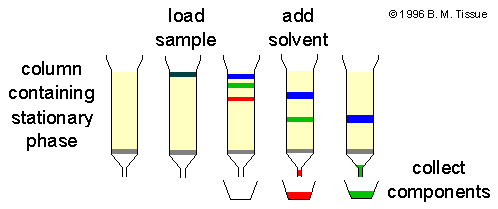Liquid chromatography (LC) is an analytical chromatographic technique that is useful for separating ions or molecules that are dissolved in a solvent.

If the sample solution is in contact with a second solid or liquid phase, the different solutes will interact with the other phase to differing degrees due to differences in adsorption, ion-exchange, partitioning, or size.
These differences allow the mixture components to be separated from each other by using these differences to determine the transit time of the solutes through a column.
Instrumentation Simple liquid chromatography consists of a column with a fritted bottom that holds a stationary phase in equilibrium with a solvent. Typical stationary phases (and their interactions with the solutes) are: solids (adsorption), ionic groups on a resin (ion-exchange), liquids on an inert solid support (partitioning), and porous inert particles (size-exclusion).
The mixture to be separated is loaded onto the top of the column followed by more solvent. The different components in the sample mixture pass through the column at different rates due to differences in their partitioning behavior between the mobile liquid phase and the stationary phase. The compounds are separated by collecting aliquots of the column effluent as a function of time.

Conventional LC is most commonly used in preparative scale work to purify and isolate some components of a mixture. It is also used in ultratrace separations where small disposable columns are used once and then discarded. Analytical separations of solutions for detection or quantification typically use more sophisticated high-performance liquid chromatography instruments.
HPLC instruments use a pump to force the mobile phase through and provide higher resolution and faster analysis time.
Copyright © 2000 by Brian M. Tissue, all rights reserved.